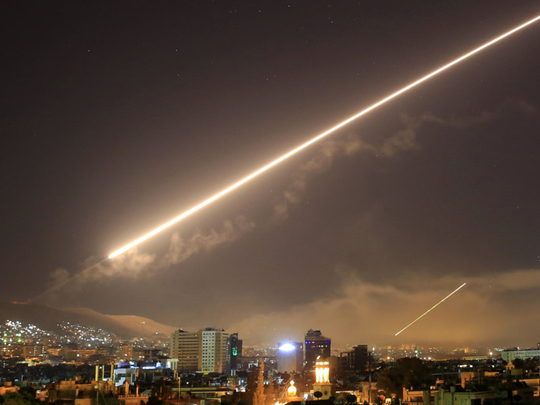
Enough to show they are serious. Not enough for it to get out of control. That, in essence, seems to be the initial lesson of the missile attacks launched on Syria on Saturday morning by the US, France and Britain. This judgement may of course prove premature, as so much else that has been said about the Syrian conflict has been. There may be further western strikes within hours and days. There may be retaliation in some form. The western allies’ version of events on the ground may prove over-simplified — it is already being contested in Syria.
Other military players in Syria and in the region — Israel, Turkey, Iran, and their proxies, as well as militant groups — may use the opportunity to advance their own interests. At this early stage, as reported in the West, the strikes appear relatively limited. But there is always a fog of war and always a free-for-all of narratives. The complexity of the Syrian crisis, and the wider regional struggle for advantage remain a tinderbox. Judged against all this, the missile strikes are less a military intervention than an attempt at a diplomatic one. As Clausewitz’s famous sentence says, war is a continuation of politics by other means. In that sense, the missile strikes are an attempt to do three things: to uphold the long-established international ban on the use of chemical weapons in the wake of the latest probable use of them by Syria in Douma a week ago; to mount a long-delayed but still quite modest challenge to Russian, Iranian and Turkish de facto international domination of the Syrian situation; and to say, by the use of military force, that the western powers remain involved in the humanitarian and regional crisis and must be involved in its outcome.
How far any of these objectives have been significantly advanced by the strikes is too early to say with certainty. But the apparently limited nature of the missile attack — launched from outside Syrian airspace, confined to chemical-warfare related targets, and according to the Pentagon a one-off — suggests that their larger impact is fairly marginal. The early absence of howls of real or confected outrage in Damascus, Tehran and Moscow could be significant. But it may not last.
For the US, the attack again exposes the ambivalent nature of its involvement. The US is heavily involved in Syria and Iraq in the battle with Daesh (the self-proclaimed Islamic State of Iraq and the Levant). But even today it is still keeping the Syrian civil war at arm’s length. US President Donald Trump came to power wanting to keep out. Last week, he looked ready to tweet the world into a nuclear war. Now, as last year, he has followed Pentagon advice and confined himself to a surgical strike against Bashar Al Assad’s forces. That strike is, though, another nail in the coffin of Trump’s Russia policy. For France, the attack is a significant step in Emmanuel Macron’s determination to consolidate his country’s place, and also to advance Europe’s place, as a player on the international stage. Macron’s foreign policy is about the projection of European values and French leadership. These strikes advance that strategy and Macron will be keen to push further.
And Britain? Theresa May is caught between foreign policy imperatives and domestic political realities. Britain wants international cooperation against chemical weapons use in Syria and Salisbury alike. It has not wanted France to go it alone or as Washington’s only ally. But May leads a minority government in a country that is sceptical about the use of intervention. Public opinion in Britain is pretty realistic. It does not want an overblown ground engagement. But it also knows that, if you stand for universal humanitarian values, like the ban on chemical weapons, those values sometimes have to be fought for.
In her video address on the strikes, May was at pains to emphasise their limited nature: “This is not an intervention in a civil war. This is not about regime change,” she said. She has calculated, probably rightly, that an early and limited strike — a mere four RAF planes — is politically safer for her than the risk of going to parliament for advance permission. She must think she will win support from Parliament next week in retrospect. It remains the case, in spite of what has just happened, that a government can only take military action with political backing to do it; this is merely a different version of the route followed unsuccessfully by David Cameron in 2013. May has not suddenly become a Thatcher-style Iron Lady. This is not her Falklands. She will pray it is not her Iraq or her Suez.
Enough to show they are serious. So it ought to be. Not enough for it to get out of control. But it still might.
— Guardian News & Media Ltd
Martin Kettle is an associate editor of the Guardian.










